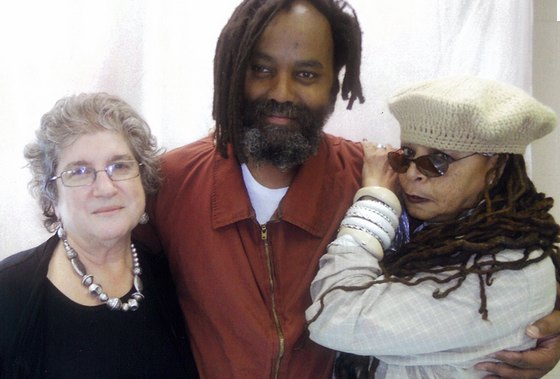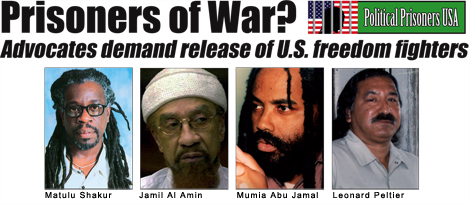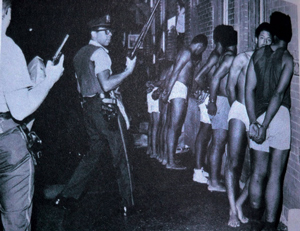The Secret Scheme To Sabotage Abu-Jamal's Appeal Rights
Aug. 24, 2012 This Can't Be Happening
Mumia Abu-Jamal, the internationally recognized American political prisoner, thwarted a Philadelphia judge’s secretive court order that could have eliminated his future appeal rights when he filed a last- minute motion on August 23rd challenging that order sentencing him to life-without-parole.
Most supporters and detractors of Abu-Jamal had been expecting the formal conversion of his controversial death sentence to life-without-parole in the wake of a federal appeals court’s second and final rejection of requests from Philadelphia prosecutors to keep Abu-Jamal on death row back in April 2011.
What was unexpected by Abu-Jamal supporters were the procedures surrounding the secretive court order, which appears to have violated a number of Pennsylvania Rules of Criminal Procedure.
Abu-Jamal’s Pro Se Motion for Post Sentence Relief and Reconsideration of Sentence referenced Rule 720 of Pennsylvania’s Criminal Procedure which states in part that defendants shall “have the right” to make post-sentence motion but that motion must be filed “no later than 10 days after imposition of sentence.”
That secretly issued resentencing order occurred on August 13, 2012, exactly ten days before Abu-Jamal filed his motion.
If that ten-day filing period had expired, undiscovered due to secrecy-shrouded issuance of the resentencing order about which no public notice or notice was provided to Abu-Jamal and his legal team, his legal ability to challenge his continued confinement would have been damaged, including his probable loss of future appeal rights.

Court rules and common decency require notice of court actions -- both pending and actually taken.
“This is the same backdoor stuff that’s always done to him,” a Mumia attorney, Rachel Wolkenstein, said during an interview outside of Philadelphia’s Criminal Justice Center after delivering Abu-Jamal’s motion.

Wolkenstein, who has worked on Abu-Jamal's case for over two decades, uncovered that secretly issued judicial order.
She became aware of it during a routine inspection of Philadelphia court records checking to see when a resentencing would occur.
Wolkenstein immediately informed Abu-Jamal and his legal team, all of whom were unaware of the order.
Wolkenstein then made two trips to the Pennsylvania prison holding Abu-Jamal, the last trip to bring Abu-Jamal's Motion to the Philadelphia court house a few hours before that ten-day filing deadline expired.
Rule 114(b)(1) of Pennsylvania’s Rules of Criminal Procedure states that a “copy of any order or court notice promptly shall be served on each party’s attorney…” –- procedures apparently not followed in this resentencing of Abu-Jamal.
Another provision of those Procedures, Rule 704, states the sentencing judge must advise a defendant “of the time within which defendant must exercise” their right to appeal and other post-sentencing matters.
“A number of death sentences have been reversed in Pennsylvania and the person's given life sentences. As far as I know each of those persons received more formal proceeding than what happened here,” Wolkenstein said.
Rule 114(A)(2) of Pennsylvania’s Criminal Procedure states that “all orders and court notices promptly shall be placed in the criminal case file.”
Yet Wolkenstein said when she asked Philadelphia court clerks for the resentencing file days after the order’s issuance, court clerks told her there was no file containing a record of that resentencing.
Philadelphia Court Clerk officials, when contacted for comment, requested that questions be made in a written format for review by their lawyers. Those officials did not reply to the submitted questions by the time of this article’s posting.
Another factor further obscuring that resentencing order, Wolkenstein said, is that the court docket captioned under the birth name Abu-Jamal -- Wesley Cook -- hasn’t been used since the late 1960s.
The majority of court files and court rulings (state and federal) list the name Abu-Jamal not Cook, thus persons examining court files generally look for Abu-Jamal and not the name Cook.
The perverse procedures swirling around that resentencing order were not unusual, given the legal improprieties and other irregularities that have stained Abu-Jamal’s case since his December 1981 arrest for killing a Philadelphia policeman.
Philadelphia’s President Judge, Pamela P. Dembe, resentenced Abu-Jamal to life-without-parole on August 13th, according to sketchy Philadelphia court docket documents.
Those documents state that Dembe was acting in accordance with a December 2001 order from a federal district court judge who voided Abu-Jamal’s death sentence after ruling that the judge at Abu-Jamal’s 1982 murder trial had incorrectly instructed the jury on how to conduct its death penalty deliberation.
“Nothing in that federal ruling says it’s OK for no notice and no record in the resentencing,” Wolkenstein said, questioning the legality of the resentencing.
Abu-Jamal, despite having his death sentence vacated in 2001, remained in death-row isolation until December 2011 because the federal judge that eliminated his death sentence granted a punitive request from Philadelphia prosecutors to keep Abu-Jamal on death row while they appealed that judge’s ruling -- a process that took ten years.
Abu-Jamal's Motion cites the fact that he wrongfully spent nearly thirty-years in death row isolation on a sentence federal courts ruled was illegal. His supporters, like Wolkenstein, cite that illegal death row incarceration as fact enough to release this man whose published six critically acclaimed books and over a thousand commentaries while on death row.
Philadelphia prosecutors pursued two unsuccessful appeals in federal appeals court seeking unsuccessfully to reinstate the death sentence that was vacated in 2001. There were also two efforts going up to the U.S. Supreme Court seeking to uphold an execution.
In early December 2011 Philadelphia prosecutors announced that they were no longer appealing those federal appellate court rulings, thus ending their effort to execute Abu-Jamal.
But Pennsylvania prison authorities, instead of removing Abu-Jamal totally from solitary confinement in compliance with those long-delayed federal court rulings at that point, initially simply shifted him from death row to the more draconian isolation of administrative custody.
Prison officials advanced ever-changing rationales for keeping Abu-Jamal in administrative custody, including the Kafkaesque claim that they needed legal clarification that courts had formally replaced Abu-Jamal’s death sentence with life in prison.
Prison officials, in January 2012, facing international protests, finally relented and released Abu-Jamal from isolation into general population.
Judge Dembe’s secretive resentencing is in concert with earlier improprieties that have stalked all facets of Abu-Jamal’s arrest, trial, appeals and imprisonment.
Philadelphia police, for example, right from the moment of Abu-Jamal's arrest at the scene of the shootings, failed to perform the standard test to prove Abu-Jamal had even fired the pistol that police said he used to kill the officer.
One of the gravest yet least examined improprieties occurred on the eve of a pivotal 1995 appeal hearing when then then Pennsylvania Governor Tom Ridge issued a death warrant on Abu-Jamal.
That warrant was issued because lawyers in Ridge’s office had secretly and unlawfully intercepted correspondence between Abu-Jamal and his lawyers, and discovered the date they planned for the filing of their client’s appeal.
That Ridge-issued death warrant severely disrupted Abu-Jamal’s appeal proceeding, forcing Abu-Jamal’s defense team to fight the warrant while simultaneously preparing for the appeal hearing.
The execution date was also used by the appeal hearing judge -- Albert Sabo, who had also been the judge at Abu-Jamal's original murder trial -- as a justification for unduly speeding that hearing. That gratuitous rush Sabo ordered further constrained defense efforts by limiting their ability to locate and bring in witnesses.
Additionally, issuance of that death warrant was improper because Abu-Jamal had a constitutional right to that 1995 appeal of his death sentence before an execution could take place.
Federal and state courts have persistently ignored that glaringly improper intervention by Ridge, which effectively robbed Abu-Jamal’s of a key step in his appeal rights -- the right to have a fact-finding review of his flawed 1982 trial and to introduce new evidence of innocence.
Significantly, Judge Dembe is the same jurist who years ago rejected compelling evidence that the judge in Abu-Jamal’s 1982 trial had made a racist, prosecution-favoring admission on the eve of the proceeding.
A court stenographer had come foreward and announced that she had, back in 1982 during the jury selection phase of the trial, overheard that trial judge, the infamous Albert Sabo, declare to his court aide that he was going to help prosecutors “fry the nigger,” a clear reference to Abu-Jamal.
Racist and/or pro-prosecution bias by a judge is forbidden by Supreme Court rulings and by Pennsylvania’s Code of Judicial Conduct, not to mention basic principles of Common Law.
Yet, Dembe refused to take testimony from the stenographer to determine the veracity of allegations from that woman, who hails from a family of police officers.
Dembe, in a ruling exhibiting ridiculous reasoning, claimed Sabo’s racist, pro-prosecution rant was immaterial to Abu-Jamal’s conviction because, she opined, a jury not Sabo convicted Abu-Jamal.
Dembe’s fundamentally flawed assertion pretended that Sabo, as trial judge, did not influence the course of the trial in a series of sabotaging actions like stripping Abu-Jamal of his right to represent himself at trial just days before testimony began (and sending his defense into a tail-spin), withholding favorable Abu-Jamal evidence from jurors, and even selecting a juror for duty who had honestly admitted to being solidly biased against Abu-Jamal.
The injustice in Abu-Jamal’s long-running case has elicited condemnation from numerous entities as diverse as Amnesty International, the NAACP and the City Council of Munich, Germany.
The injustice evident in Abu-Jamal’s case is consistent with the injustice exhibited daily by some Philadelphia police, prosecutors and judges.
The same day Abu-Jamal filed his resentence-challenging motion, a Philadelphia judge convicted Philadelphia broadcaster Jeff Hart of disorderly conduct for a minor incident arising from Hart's observing police brutality during the arrest of a suspect near Hart’s house.
Hart said the false disorderly conduct charge followed his politely asking a Philadelphia policeman to not use profanity repeatedly when ordering Hart and another man from the arrest scene.
Abu-Jamal, an award-winning broadcast journalist at the time of his 1981 arrest, frequently reported on this kind of rampant police abuse in Philadelphia.














